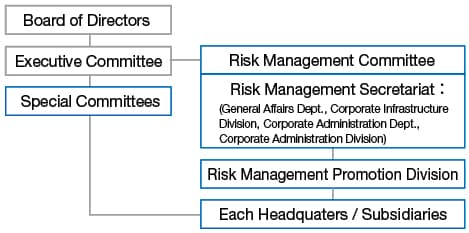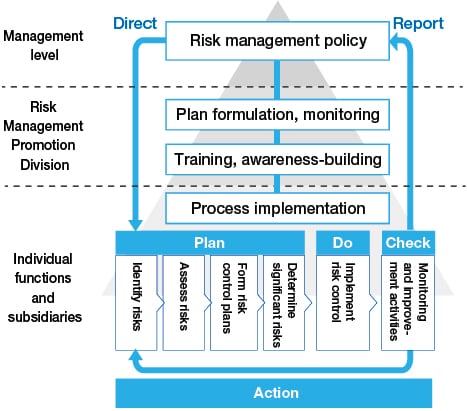Challenge
- Management of all risks surrounding the entire Group
- Crisis response (responding resiliently to natural disasters, infections and other crises)
Relevant stakeholders
- Direct
- Employees, suppliers, local communities
- Indirect
- Shareholders and investors, creditors, NGOs, industry groups
Our policy
The risks considered likely to impact Toyo Tire Group business activities are growing increasingly diverse and complex. We believe pursuing risk management that fully grasps, assesses, classifies and responds to these latent company-wide risks will help generate sustainable growth, maintain corporate value and fulfil our responsibility to all our stakeholders. The Group conducts risk management from two perspectives: managing risks and responding to crisis events.
We comprehensively and regularly inspect and manage any risks that we could potentially face across the value chain in which we conduct our business. We have positioned risks that would have a significant impact on our business if they were to materialize as “significant risks” and work continuously and strategically to prioritize our response to these risks in our risk management processes. If a crisis event should occur, we would establish an emergency response headquarters as necessary to help implement individual measures while maintaining organizational control.
Responsible executive (as of April 2025)
Corporate Officer and Vice President of the Corporate Headquarters (Chief Risk Management Officer)
Organizational responsibilities (April 2025)

The Group has a Risk Management Committee that oversees risk management and operates independently from the Audit & Supervisory Board. It sits under the Executive Committee, which is the decision-making body for business execution. The Risk Management Committee meets, in principle, four times a year to improve risk management and crisis management frameworks and monitor their progress. The details of that progress are reported twice a year to the Executive Committee and once a year to the Board of Directors.
(1) Risk management
The Group has also established a Risk Management Secretariat that operates under the Risk Management Committee. The secretariat identifies and assesses risks on an annual basis, plans risk control measures, selects and defines significant risks, and implements risk control measures. In addition, the Sustainability Committee and various other special committees, along with the Risk Management Promotion Division, monitor the status of risk management measures at Group companies on a quarterly basis.
Furthermore, the department in charge of each individual risk engages in risk management by regularly identifying, assessing, addressing, monitoring and reviewing risks at all stages of business activities in a cyclical manner based on Risk Management Rules established in accordance with various regulations including the COSO-ERM* risk management framework. We hold briefings for each department when assessing risks to help foster an attentive risk management culture across our organization.
- * COSO-ERM is an enterprise risk management (ERM) framework published by the Committee of Sponsoring Organizations of the Treadway Commission (COSO) based in the United States. It was originally published in 2004 and revised in 2017.

(2) Crisis management
Toyo Tire Corporation has established a crisis management system that is overseen by the Chief Risk Management Officer (in charge of the Corporate Headquarters) based on the Company’s Risk Management Rules. We appoint a crisis management officer for each significant crisis event* expected to have a significant impact on the Toyo Tire Group, prepare individual response manuals, and determine measures for addressing these risks in both regular times and times of emergency.
If an emergency event were to occur, the Chief Risk Management Officer would convene an emergency response meeting to determine the optimal response based on the degree of impact that the event would likely have on the Group and its stakeholders, and help resolve any issues.
- * Disasters and accidents, quality, purchasing, legal violations, information management, labor
Crisis management leader duties
Leaders carry out the following duties for the type of crisis they are assigned to.
- Develop and maintain crisis management systems, measures, rules and structures, and create and manage individual management manuals.
- Report to the Risk Management Committee once a year on (i) progress in creating a crisis management structure, (ii) evaluation of that structure and plans for improvement, and (iii) implementation of the improvement plans.
- Immediately report to the Chief Risk Management Officer if they hear concerns of an emergency from a head office manager, business site manager, or division manager.
Activities
Risks pertaining to the Toyo Tire Group
We categorize risks pertaining to the Group according to the likely cause of any potential occurrence. Target risks for each category are then identified and assessed.
We define significant risks as those that would have a serious impact on both current and future Group business activities, and have made them of top priority to address. Significant risks will be reviewed as necessary in light of changes in the external environment or Group business conditions.
Significant risks and other major risks
| Category | Definitions | Major applicable risks |
|---|---|---|
| Health and safety, disaster prevention | The occurrence of occupational accidents, fires, etc. that hurt employees or damage the business |
|
| Quality | Products or services that fail to comply with customer demands, standards, or regulations |
|
| Human resources | A situation in which excessive working or violations of labor-related laws and regulations threatens the physical and mental health of employees |
|
| Supply chain | The suspension of factory operations due to suspended supply of raw materials or distribution network disruptions |
|
| Legal and compliance | The company gets sued for insider trading, the falsification of data, violations of the Unfair Competition Prevention Act, or intellectual property rights infringements |
|
| Information security | Interrupted operation of core systems caused by viruses or the hijacking of systems |
|
| Finance and accounting | Significant monetary damage is incurred as a result of fraudulent accounting or sudden changes in financial market |
|
| Natural disasters | Business suspension due to earthquakes, typhoons, or other natural disasters |
|
| Business environment | Sharp decline in sales caused by changing marketing needs or unsuccessful marketing |
|
| Management strategy | Inability to achieve the scenarios envisaged in management strategies |
|
| Governance | Financial losses and reputational damage caused by poor governance |
|
In recent years, we have placed greater priority on addressing risks relating to information security and management strategy.
We identify risks relating to information security, such as system failures and information leaks resulting from cyberattacks, and risks relating to management strategy, such as national conflicts, policies and other geopolitical risks that transcend traditional country risk frameworks, and develop countermeasures to attentively address each risk.
We identify risks associated with climate change and human rights risks in all our business activities, including our supply chain, and assesses their significance, as well as formulates countermeasures in cooperation with relevant divisions and reports on such activities to the Sustainability Committee. The Risk Management Committee, which oversees company-wide risk management, investigates and confirms the effectiveness of the risk management activities conducted by various special committees and organizational functions within the Group, including any measures taken to counter the above-mentioned type of ESG risks, on a quarterly basis. The Risk Management Committee regularly reports the results of its investigations to the Executive Committee and the Board of Directors.
Business continuity plan development and business continuity management drills
The Toyo Tire Group has developed business continuity plans (BCP) based on impact assessments and damage estimates in anticipation of scenarios for large-scale disasters and infectious diseases. We have also been working to improve our plans through regular BCP drills.
In 2019, our US subsidiaries established an emergency response plan and BCP in preparation for a disaster. These include emergency communication protocols in the event of a pandemic or natural disaster, emergency medical procedures (such as securing resuscitation equipment and training on its use), and measures to ensure business continuity.
In Japan, we have been conducting drills at the Toyo Tire Corporation headquarters and Tire Technical Center since 2021, which include checks of whether the Emergency Countermeasures Headquarters properly performs its function in an emergency based on information received from each department. We then review each department’s action plan and update our master plan.
